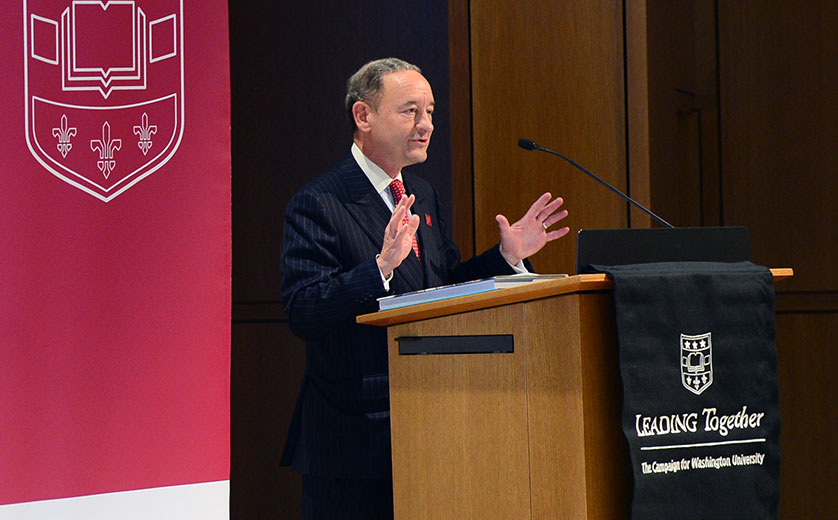Washington University in St. Louis has announced that Leading Together: The Campaign for Washington University is expected to reach its initial minimum goal of $2.2 billion about two years ahead of schedule. The campaign total reached $2.12 billion as of December 31, 2015. The university’s Board of Trustees has approved a new goal to raise $2.5 billion by June 30, 2018.
Leading Together has attracted record support so far from more than 120,000 alumni, parents, and friends of Washington University, including hundreds of volunteers in St. Louis and in cities across the United States and worldwide. Their generosity is helping to strengthen the university’s leadership and contributions to society in four key areas: preparing the leaders of tomorrow, advancing human health, inspiring innovation and entrepreneurship, and enhancing the quality of life.
“We have achieved great progress,” says Washington University Chancellor Mark S. Wrighton. “As a premier research university, we have a responsibility to anticipate the challenges of the future and prepare to meet them. This is the core of Leading Together, which has as its overarching goal ‘to enhance our leadership today to benefit America and the world tomorrow.’”
The campaign was publicly announced on October 6, 2012. At that time, the university identified $4 billion as the total needed to fully realize its strategic plans for the future. Washington University’s leadership in medicine, social work, and undergraduate education is recognized worldwide, and the university is a global leader in liberal arts education. Recent decades have seen enormous progress in the strength and quality of other programs, including engineering, law, the John M. Olin School of Business, and the Sam Fox School of Design & Visual Arts.
“We have not yet accomplished everything we set out to do,” Wrighton says. “A great university has great responsibilities—to our students and to the society we serve. That responsibility has increased in proportion to the growth and progress we have achieved through the campaign. It offers an unprecedented opportunity—and a responsibility—to aim even higher.
“Leading Together already has enabled us to make exciting new breakthroughs in medicine and genomics to support the fight against cancer, Alzheimer’s disease, mental illness, and other devastating diseases. The campaign has helped us build on our expertise in social work, public health, law, and business to improve the well-being of people in St. Louis and in communities around the world. The campaign has made it possible for our scientists and scholars to make new discoveries and innovations in the sciences, the social sciences, and the arts. It enables our researchers to work toward a sustainable environment and a more just society. And Leading
Together is striving to make a top-tier education possible for every qualified undergraduate and graduate student who aspires to attend Washington University.”
Leading the public phase of the campaign is Andrew C. Taylor, a Washington University trustee and the executive chairman of St. Louis-based Enterprise Holdings. Trustees John F. McDonnell, retired chairman of the board of McDonnell Douglas Corporation, and Sam Fox, former U.S. Ambassador to the Kingdom of Belgium and founder and retired chairman and CEO of Harbour Group Ltd.,guided the campaign’s initial leadership phase, which raised more than $1 billion between March 2009 and October 2012.
“Great research universities and academic medical centers are shaping the future of our world today,” Taylor says. “Individuals and organizations all over America and around the world are investing in a St. Louis institution because Washington University delivers the best possible return on philanthropic investment—and few institutions deliver more significant, critical contributions to the future of humankind than Washington University.” For example:
- Washington University School of Medicine is leading innovative research to understand the genetic origins of diseases ranging from cancer and diabetes to autism and Alzheimer’s, with the aim of developing more effective diagnoses and treatments.
- The Siteman Cancer Center at Barnes-Jewish Hospital and Washington University School of Medicine has earned the highest possible rating—“exceptional”—from the National Cancer Institute. The center serves nearly 9,000 newly diagnosed cancer patients each year.
- As the top-ranked school of social work in the nation, the Brown School is an international leader in policy and procedures to address challenges from poverty to productive aging.
- The Institute for Public Health harnesses the multidisciplinary strengths of Washington University to address complex health issues facing St. Louis and communities worldwide.
- Each year, Washington University physicians provide clinical care to nearly 500,000 childrenand adults at 49 clinical sites across the St. Louis metropolitan area.
- Research initiatives across the university are laying the scientific groundwork to help meet the global need for abundant, clean, and economical energy.
- Washington University was one of the founders of the Cortex Innovation Community in midtown St. Louis, which so far has attracted more than $550 million in investment and generated more than 3,600 permanent jobs in the Cortex District. In the last 48 months,Cortex development has resulted in an additional $500 million of private investment and development in 20 surrounding neighborhood projects.
- Washington University collaborates with 29 leading institutions worldwide to educate future leaders and address global challenges such as energy and sustainability, public health, education, and international understanding. These efforts are carried out through the McDonnell International Scholars Academy, which is celebrating its 10th anniversary this year.
“Our alumni and friends have worked together to make Washington University a world-renowned center of learning and discovery,” Wrighton says. “Their generosity will have a lasting impact—on human health, on a sustainable environment, on economic prosperity, on quality of life, and on the young people who will lead our society in the future. Together, we will build on our accomplishments to contribute even more to our community, our nation, and our world.”
